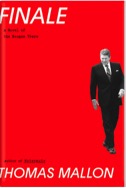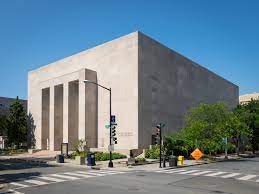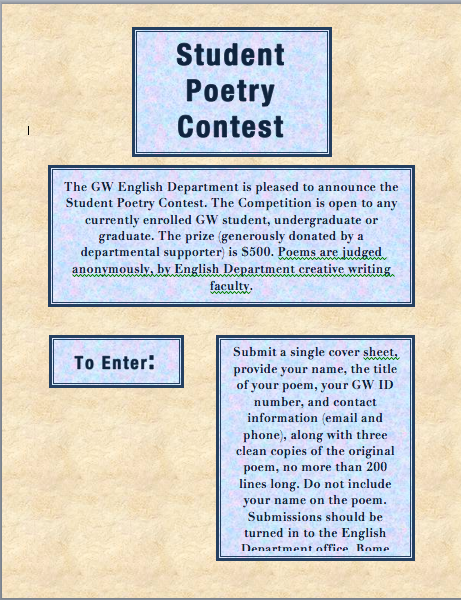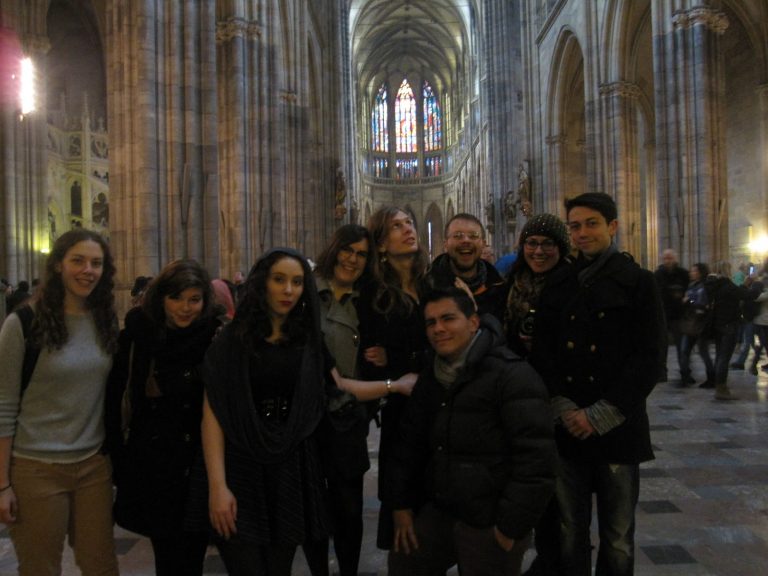(Thomas Mallon on tour last week in Cambridge, Massachusetts. Photo credit: Robert Birnbaum)
Thomas Mallon, acclaimed novelist and former Director of Creative Writing at GWU, has just published his ninth novel, Finale, to wide critical acclaim. His account of the Reagan administration “blends his singular knowledge of political history with his limitless imagination to capture an era” (Philadelphia Inquirer). Mallon, who received his Ph.D. from Harvard University in English and American Literature, has had a stunningly multifaceted career, the variety of which exemplifies the range of his strengths and interests. As a famed critic, novelist, essayist, and professor, Thomas Mallon has been an invaluable asset to the English department at The George Washington University.
 He is currently touring with Finale, and has three events in Washington, D.C., that should not be missed:
He is currently touring with Finale, and has three events in Washington, D.C., that should not be missed:Sunday, September 27, 5:00 pm
Politics & Prose
5015 Connecticut Ave NW, Washington, DC
Tuesday, October 13, 6:30 pm
Kramerbooks
1517 Connecticut Ave NW, Washington, DC
Tuesday, November 17, 5:30 pm
National Press Club’s 38th Annual Book Fair
529 14th Street Northwest, Washington, DC
I had the pleasure of interviewing Mr. Mallon, who was not only incredibly knowledgeable and insightful, but also witty and personable. Like his novels, he relates fascinating, extensive political and historical knowledge in an unpretentious way that is both entertaining and accessible.
Mallon has been specifically praised for his development of the female characters in his political novels, including Nancy Reagan in Finale. He described to me how “the women tend to run away with my novels,” and argued that despite its surface harshness, his new book’s portrayal of Mrs. Reagan is intended as sympathetic. “She was a kind of raw nerve, constantly strategizing to protect her husband, eating herself alive, really. I don’t think she had ten relaxed minutes in the White House. Despite the famed closeness of their marriage, I don’t believe even she understood Ronald Reagan. He was a mystery that eluded even her.”
When writing about the 40th president, Mallon had to deal with that same mystery . He found it much harder to access Reagan’s interiority than it had been to get inside Richard Nixon in his previous novel, Watergate. “I don’t know what it says about my moral character [laughs], but I never had any trouble writing from Nixon’s point of view. Reagan was too ungraspable. I never wrote him as a POV character. Instead, I made use of what I learned from Gore Vidal, whom I used to edit when I was at GQ. In his novel Lincoln, we get an entirely external view of the President; he’s seen only from other persons’ perspectives. You never go inside.”
In terms of research, Mallon finds living in D.C. hugely advantageous. He created his comprehensive account using a wide and innovative array of source material. “Over my years here I’ve met people who served in Reagan’s administration and talked to them one on one. I did a tremendous amount of reading—memoirs, documents, newspapers. Insofar as it’s possible, writers of historical fiction should try to eliminate the ‘middleman,’ which is to say the historian. Read less about the period and more fromit.”
Mallon took pains to fully recreate the exact historical context and setting for his novel, even traveling to Iceland in order to reconstruct the location and atmosphere of Reagan’s October 1986 summit meeting with Soviet leader Mikhail Gorbachev. “I made arrangements to explore that little white-framed house by the ocean, where the talks took place. I went to the American embassy; stayed in the same hotel that some of the arms-controllers did; talked to some of the people who’d been around almost thirty years before. I made the trip at the same time of year Reagan did, in order to experience the same kind of light and temperatures, to get an accurate feel for what it would have been like.”
The Library of Congress was another invaluable resource, containing as it does the public and personal papers of two important characters in the book, Pamela Harriman—leader of the Democrats’ efforts to retake the Senate in 1986—and Donald Regan, the President’s Chief of Staff and the man Mallon calls Nancy Reagan’s “mortal enemy.”
Mr. Mallon traveled to the Reagan Library in Simi Valley California, but also made use of our very own Gelman Library, whose National Security Archive contains detailed notes from the Reykjavik summit. “I absolutely could not have written the Iceland scenes without those records.”
Since next spring will be the final chapter of Mallon’s time at GW, I asked about his fondest memory here. He responded: “Over the decade I taught here, my favorite experience was probably my Dean’s seminar on the assassination of Lincoln, a course I taught about half a dozen times. We visited local sites connected to the event, and in addition to reading the history of the assassination, students read historical fiction about it; read poetry by Whitman and Melville and others; looked at historical paintings and Mathew Brady’s photographs; studied the symbolic architecture of the Lincoln Memorial.”
This expertise on Lincoln will certainly continue to be put to good use, as one of the two novels he plans to work on during his retirement will take him back to the Civil War, a period he previously explored in Henry and Clara, his novel about the couple with the Lincolns in the balcony at Ford’s Theatre. The other novel will examine more recent history, namely, the George W. Bush administration. “That’s so recent I’m not sure it can even be called historical fiction,” says Mallon. He will also continue writing for The New Yorker and doing his occasional “Bookends” column for The New York Times Book Review.
Luckily for us, Thomas Mallon will continue living in Foggy Bottom, and looks forward to remaining a part of the university community.
For more on Finale, click here to listen to last Sunday’s interview on NPR’s “Weekend Edition.”
Also, Thomas Mallon’s most recent piece for The New Yorker, on the legendary Washington political columnist Drew Pearson can be found be found here.
And below is a sampling of what reviewers have been saying about Finale:
“Mallon is a poised storyteller who traffics in history’s ironic creases. His novels don’t upend conventional wisdom so much as remind us that history is a rickety architecture of human endeavor—that today’s statues commemorate yesterday’s frail and fumbling mortals . . . ‘Finale’ represents Mallon’s most audacious and important work yet . . . Mallon’s portrayal of the first lady is humane, thoroughly convincing and counts as one of the book’s triumphs. So is his presentation of Richard Nixon, with whom ‘Finale’ opens, rather unexpectedly . . . As in his previous novels, Mallon works deftly with an ensemble cast, employing both real-life and fictitious characters … [a] galloping narrative. ”
—The New York Times Book Review
“Thomas Mallon has carved an impressive place for himself in the art of ‘historical fiction,’ a genre whose august forerunners include Tolstoy’s ‘War and Peace’ and Lampedusa’s ‘The Leopard’ . . . Mr. Mallon has cautioned, in the author’s note to his earlier novel ‘Dewey Defeats Truman’ (1997): ‘Nouns trump adjectives, and in the phrase “historical fiction” it is important to remember which of the two words is which.’ He handles the distinction expertly, but part of the pleasure of reading him is deciding when the author is fudging historical fact. ‘Finale’ offers a certifiable slice of the recent past but teases its readers with subtle fictionalization . . . It is high-calorie stuff, and Mr. Mallon handles it with an easy mastery.”
—Wall Street Journal
“The kind of novel Washington loves . . . anchored in historical events and oozing withering assessments of real-life people, many of them still alive . . . This is a political novel, but it’s a story about the limits of human ambition . . . Wicked good, that Thomas Mallon.”
—Washington Post Book World
“What consumes the astute and well-informed Mr. Mallon is political give-and-take, both domestic and international. His theatrical novel brings to life historical figures who long ago became historical footnotes . . . a book that reads like a divertissement, but resonates far deeper . . . Mr. Mallon’s vivid take on this period in American politics rings true. He effectively gets inside his characters’ heads, too. The one head Mr. Mallon doesn’t get inside, except in a brilliant epilogue at the very end, is Mr. Reagan’s own—which is eerily appropriate, even faithful.”
—Pittsburgh Post-Gazette
“Mallon has become a master of political theatre . . . What makes [his] novels so much fun is the author’s blend of historical exactitude with imagined reactions and machinations.”
—Christian Science Monitor
 He is currently touring with Finale, and has three events in Washington, D.C., that should not be missed:
He is currently touring with Finale, and has three events in Washington, D.C., that should not be missed:
 He is currently touring with Finale, and has three events in Washington, D.C., that should not be missed:
He is currently touring with Finale, and has three events in Washington, D.C., that should not be missed:




